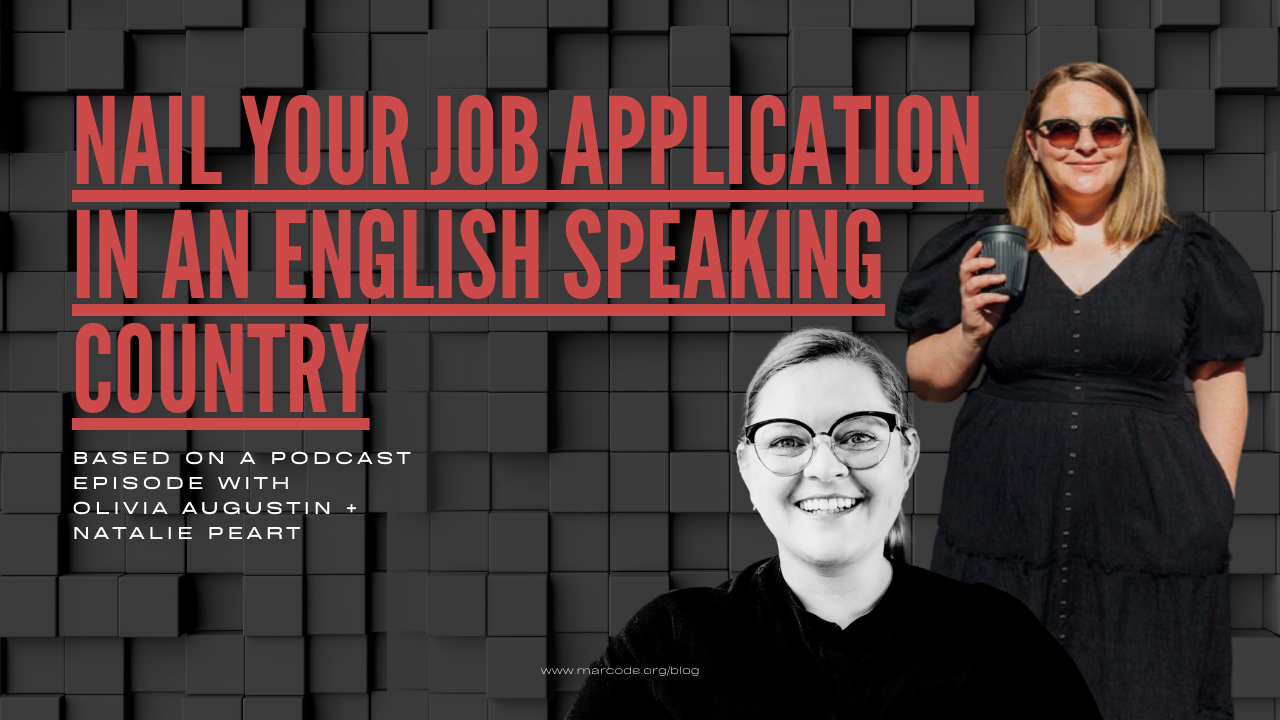
How To Nail Your Job Application In An English Speaking Country
Aug 14, 2023Getting a job in an international company can feel impossible as an engineer.
While you have the job skills, you don’t necessarily have the confidence to communicate.
Surprisingly, your English probably isn’t what’s holding you back. Job processes vary in every country, and cultural differences can make or break your application.
Here’s how to successfully get a job in an English-speaking country.
Learn The Differences
I recently chatted with Natalie Peart, who explained she specializes in the Australian hiring process because every job search, workplace, and job market has a different communication style. She works with Australian immigrants, but you can apply her tips to any nation.
Learning the differences of the country is essential before you apply for a job. For example:
- Some places use more formal terms. Other companies prefer slang in spoken conversation.
- Dress codes can vary for interviews from casual to formal.
- Personal questions during interviews are illegal in many English-speaking countries, so make sure you know your rights.
- Resume and CV structure varies and can prevent your application from moving forward if they’re in the wrong format.
- Practices like updating your LinkedIn profile can help you get a job.
- Working in another country or language can bring out the imposter syndrome. Hone into your accomplishments and realize just how valuable you are.
Your best bet? Watching and listening for cultural differences.
Immigration
Moving and working to another country is a long process. Not only do you have to pack up everything and start from scratch, but you also have to follow the legal immigration processes. Most employers will sponsor you. Some employers and countries will require you to take an IELTS test, others might not. I’m not a fan of studying for the IELTS unless you need to take it because it doesn’t help you learn practical English. You can check out more of my opinions on the IELTS here or listen to my podcast episode with Natalie.
Many English-speaking nations emphasize LinkedIn. An updated English profile with keywords, job experience, a personal summary, and a portfolio makes it easy to apply for jobs and be recruited on LinkedIn.
Natalie recommends researching the companies you want to work for and checking what others in your field are putting in their profile. You’ll then understand the norms for setting up your own LinkedIn. Always update your profile before applying to jobs.
Resume Differences
Every industry and location has a different resume structure. In Germany, CVs with photos, age, and marital status are commonplace. In many English-speaking countries, putting personal information on your resume can hinder your job application.
Instead, make sure technical skills are focused on. Natalie explains that in Australia, the emphasis is on achievements, projects, and portfolios – not just a list of jobs you’ve had. This is true in many countries as well but check with local peers to ensure your resume is in the correct format.
No matter where you’re applying to work, realizing your achievements and skills can be a long process. Working with a career coach like Natalie can help you understand your value to the company and tailor that to the country’s sensibilities.
Job Interview Structure
The scariest part of applying to an international company can be the interview. There’s a thin line between talking too much and overexplaining because you’re not confident enough about your answer. Remember, even native speakers practice before a job interview.
Natalie teaches the STAR method, so you have a story strategy for answering behavioural and job interview questions. STAR stands for situation, task, action, and result.
She explains how STAR works, “What was the situation you were in at work while using a specific skill? What task did you have to do? So you identified that you had to do something. What specific actions, step by step, did you do? What was the outcome? What was the result?”
This method tells a story, keeps you on track, and ensures you give a specific example to the employer or recruiter.
Remember, skills are useless if you can’t communicate them effectively. Story-telling is one of the easiest ways to show your results.
Hiring Process
Congratulations, you got the job offer! While this might not be your first job, this is your first time working in this company. Understanding the cultural differences of the company, region, and country will help you integrate more easily.
Leave your stereotypes behind and watch how people actually interact.
For example, in Australia, the balance between laid-back and traditional can be confusing to immigrants who’ve only seen Australians as relaxed. While workplace conversation often includes slang, punctuality is important and the divide between work and home life is clear.
In the US, your employer might seem welcoming, but, in reality, is a results-driven boss — not actually a friend.
A fast-track way to discover these hiring processes and cultural differences is to chat with another non-native person. They’ll have learned the unwritten rules that the locals take for granted.
When You’re Not Feeling Confident…
Applying for jobs will get easier, but the most important tip is to not let fear hold you back.
Express yourself authentically using the English you have. You don’t need to know all the phrasal verbs, grammar, and vocabulary to get a job. Instead, the cultural nuances are much more useful. The fastest way to learn them is to apply for jobs, learn from mistakes, and work with an international career coach.
But most importantly, don’t let vulnerability, self-doubt, and imposter syndrome stop you from applying for that foreign job.
If you need a bit more practice, check out my 1:1 offerings. We can practice interview questions and learn technical English skills. And, if you’re thinking about working in Australia, reach out to Natalie for targeted job application support.
